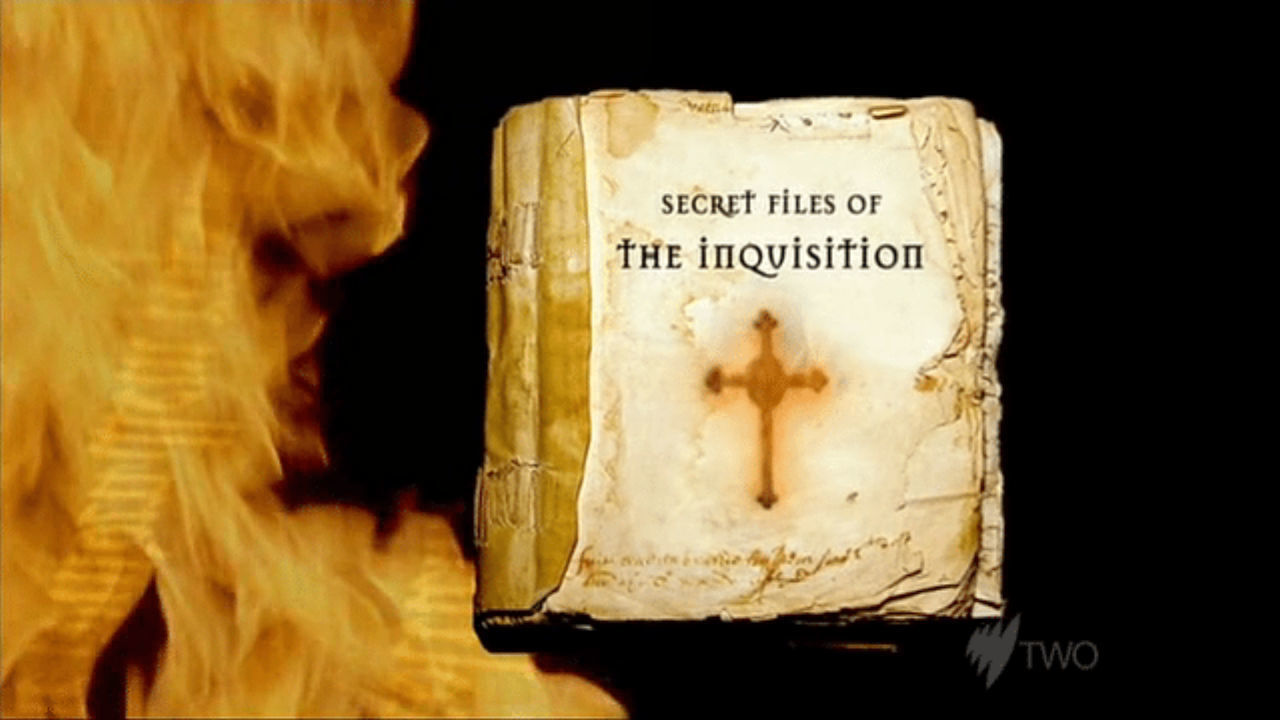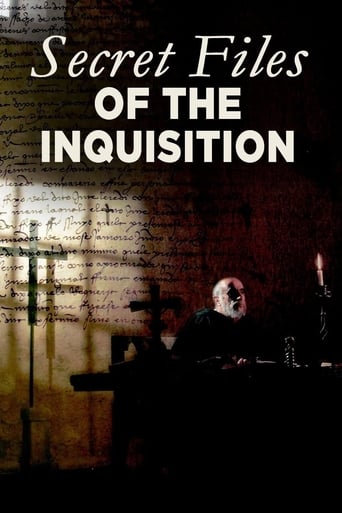Exoticalot
People are voting emotionally.
Platicsco
Good story, Not enough for a whole film
InformationRap
This is one of the few movies I've ever seen where the whole audience broke into spontaneous, loud applause a third of the way in.
dimplet
For anyone interested in the history of Europe or Western civilization, this documentary should be required viewing. Yes, it is about the Inquisition by the Catholic Church, but the documentary also shows the larger historical context, how the Inquisition affected politics in Europe, and, finally, how politics, particularly Napoleon, affected the Catholic Church's Inquisition, which was still in force.The information is presented factually and dispassionately, with excellent narration by Colm Feore and commentary by a variety of historians who maintain an equally rational tone. The representative of the Vatican does not defend the Church's actions beyond pointing out that the society and values were very different hundreds of years ago. He makes some oblique remarks condemning the actions of the Inquisition, saying they would be totally unacceptable today. But the filmmaker wisely does not turn this into a debate of the Church, right or wrong; that is for the viewer to decide. A more argumentative documentary maker might have had someone condemning the Church's actions, and pointing out that the values of society at that time were not necessarily the values of the Church, and that plenty of people undoubtedly were horrified and terrified by the actions of the Church's Inquisition. Instead, it is up to the viewer to assimilate the great quantity of facts presented, digest them and make one's own judgment. From a devout Catholic's perspective, one might say that the Inquisition was necessary to preserve the existence of the Catholic Church, which might have fractured into countless churches guided only by individual conscience.However, it seems to me, viewed objectively, there is no civilized way a person could justify the actions of the Inquisition, the killing, the sadistic torture, the barbaric imprisonment of people of conscience. Therefore, if you are a devout Catholic who believes the Church in Rome is the divine heir of the rule of Christ and the incarnation of holy will, and always has been, don't bother watching this documentary. You won't like it, as should be obvious from the other biased reviews. If you want to understand history, watch it. The cinematography is gorgeous, the re-enactments meticulously detailed and well acted, the narration does not try to manipulate emotions, the music does not become overbearing, there are no distracting MTV-type special effects as with the Murdoch-National Geographic documentaries, and there is an enormous amount of information. The documentary focuses on the lives of key or representative individuals to tell the story, and frames this within the larger historical context. My only complaint is that I left not feeling I had a clear grasp of the total impact of the Inquisition, particularly in terms of statistics, but perhaps I missed it. Inevitably, four 45-minute programs cannot encompass 800 years of history, so there are some gaps, as with almost any historical documentary. Most of all, this documentary is based on some files the Catholic Church chose to release, and focuses on a handful of individuals. We can only wonder what is in the files the Church still keeps secret. I suspect what was presented here was an understatement of the horrors committed over the course of the Inquisition. While there is a ton of factual information contained in this series, I came away with a clear sense of the broad outline of events and a changed view of this period. For a documentary to work successfully on both levels, detail and big picture, is a major accomplishment. This is what an historical documentary should be like.
shanesheibani
I too, am disturbed when the popular media is made to serve the easy-bigotry of its creators. In this case, the historical record of the Catholic Church's repression of rivals makes a tempting target for those having pre-existing animus against the Papal See.However, history repeats itself and now it is the Catholics suffering a sort of media witch hunt, ironically. But exaggeration of the actual numbers of Inquisition victims does no service to the cause of Truth. Unfortunately, I feel the exaggerated claims of this program have trivialized the historical facts it has sought to dramatize.Likewise, I prefer verifiable sources and referenced facts to the urban legends repeated by lazy or intellectually dishonest people who defend this manipulation with further rumor mongering that states "PROBABLY greatly santised", and then (predictably) offer no citations to back up their "probable" claim.However for the thinking audience, "probable" is not enough. Transparency of the producer's methods and use of legitimate source material for any claims are the minimum consideration that this show's creator's owe its viewers.
durnanjr-1
The four-part series, "The Secret Files of the Inquisition", was disappointing for its repetition of both narrative and visuals and its superficial treatment of this perverted travesty of Catholicism.The narrative was shallow: too little time was devoted to too few historians; the "company man" speaking for the Vatican was inept; credible Catholic commentators were absent.In this series. sensationalism overwhelmed serious inquiry. The iniquitous Inquisition warrants penetrating discussion. The series was a largely waste of four hours of viewing and what must have been great amounts of time, money and talent in the making.(This comment was also sent to the PBS Ombudsman.)
xpal03
Saw this "documentary" on PBS. The production values are first-rate and the direction takes a page (or a whole script's worth) from mini-series melodramas in its non-stop use of flaming motifs such as burning Church candles fading in dramatically to Jews dying in bonfires under the approving eye of Catholic villains.The program then goes on to juxtapose images of noble individual heretics with spurious claims such as the following from the episode 'The Tears of Spain'- "In its first five years the fires of the Inquisition had purified the souls of thousands, and one Spanish historian wrote that in its first hundred years, the Inquisition had touched the lives of 15% of Spain's population". By now, even lapsed Catholics like myself can discern the dishonest slight-of-hand used by the writer, director and producers of this show.One has to scour the PBS website to discover the name of this Spanish "historian" is none other than the discredited Juan Antonio Llorente, the ex Catholic official who sided with the Napoleanic invaders against his native Spain in the 1808 War between the French and Spanish. Later, when Napoleon and the French anti-Catholics were expelled from Spain, Llorente fled with them back to France to avoid a traitor's punishment. During the French invasion, Llorente helped oversee the repression of the Spanish Church and shuttering of Catholic Monasteries. But despite this shady background, the director and producers try to hustle the thinking audience by quoting Llorente anonymously. Clearly, Llorente's horror fables were exploited with a firm eye on ratings and over-the-top t.v. melodrama.To be sure, thousands were killed in the Inquisition fires but modern up-to-date scholarship like that of Henry Kamen of Yale University show that 350 years of the Inquisitions resulted in. . . 3500 deaths(average less than 10 a year). Many more were subjected to trial and torture, nonetheless, PBS continues in its well-earned reputation for factual manipulation and Church-bashing.One can imagine this show's producers throwing each other a cynical wink as the narrator breathlessly claims that "everything in the series is true". What is even more troubling is the media elite's contempt for the online audience's ability to instantly verify their show's claims. Maybe the producers felt they could pass off the Black Legend libel as unquestioned fact because liberal Jews, nominal Protestants and secular elites form much of PBS' core audience. The show's producer's are then simply serving the prejudices of their target demographic under the guise of "documentary". Interestingly, the Canadians bestowed a Gemini award on the the director of this fairy tale. Apparently, Canadians don't consider historical accuracy a criteria for documentary awards. Michael Moore must be jealous.

